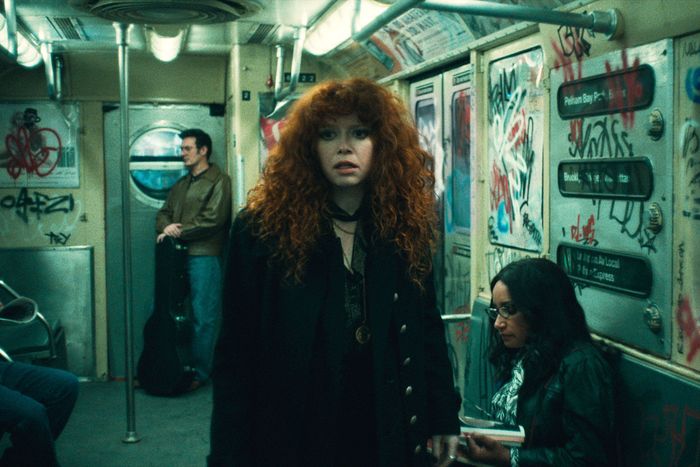
After three long years away, the trippy, time-traveling dark existential comedy of family trauma Russian Doll has returned to Netflix for a second season. In its first, the show’s star and co-creator Natasha Lyonne played Nadia, a woman trapped in a time loop at her 36th birthday party. To her annoyance and increasing terror, Nadia keeps meeting an untimely death, then, over and over again, wakes to find herself right smack at the beginning. She is stuck at the same party, stuck with the same sense of ennui and underexplored troubling childhood memories. Eventually she connects with Alan (Charlie Barnett), himself caught in a time loop, and together they realize that they have been linked by some unknown knot in the space-time continuum. And they can’t escape without finding the source of one another’s pain.
Russian Doll was that rare and precious kind of TV, a show that felt simultaneously borne out of a dozen familiar cultural sources and yet unmistakably new. It was a sui generis creation, and many pieces were responsible for its distinction. The wrinkle-in-time mystery elements have existed elsewhere, but Russian Doll was able to connect them to certain fading, grimey but appealing pieces of ’70s New York nostalgia. It was not just one woman lost in time; it is a season of TV about a woman sinking her hands down deep into layers of hyperlocal, hyperpersonal history. The second season revisits the same world and the same characters, but, for now, most of the premise has to be shrouded in mystery, per Netflix orders.
Nadia returns in season two, and so does Alan. Together they go on strange adventures through time once again, although how, and to where, and when exactly they go, I cannot say. Greta Lee is back as Nadia’s friend Maxine, as is Elizabeth Ashley as Ruth, Nadia’s longtime family friend. Annie Murphy also plays a prominent role, but describing that role is verboten, too. Some of the season takes place in 1982; some was filmed in Budapest. Use your imagination as to how that all fits together. (Hint: Baubles. Befuddlement. Babylon Berlin.)
Season two operates on larger ambition and cannot entirely hold all the ideas and images it’s trying to contain. It is stuffed — overstuffed — with schemes and emotions, hopes and dreams. All the magic achieved in the first season was closely contained within a claustrophobic experience of Alan and Nadia’s lives; the ending gestured toward expansive, all-encompassing humanity. It was the kind of small story that felt almost giddy in its secret enormity — the emotional version of peeking into a tiny closet and finding a whole world folded inside. Relatively straightforward central tenets operated inside all the madness. Now it’s like a brainstorm where someone said “No bad ideas in a brainstorm” then brought every single one of the ideas all the way to the finish line. Some work. Some are even exquisite: poignant themes of grief and parenting and the human capacity for growth that, had they been given more space to develop, might have been momentous. But even they are buried by too many other things, and it leaves Nadia’s voyage through another world-bending existential crisis feeling like an 18th-century self-aware picaresque novel crammed inside the titular nest. So many moods! So many tones, so many events, so many twists and red herrings and gold coins and bad Nazis! Through it all (or most of it, at least), Nadia’s there like a chain-smoking time-traversing hero of her own universe, cracking wise and wryly pointing out that the straight line of her life has done a bit of a loop-de-loop.
What a frustrating literalization of the show’s scope. Season two is bigger, in terms of time, geography, riddles, and mechanisms. But there’s a perverse backward effect to all that new roominess. Russian Doll wants to be more sprawling, leaving its emotional resonance smaller and emptier. Nadia’s frantic attempts to make her life right again start to feel myopic, and meanwhile there is not nearly enough Alan. The series is a hollower version of itself without him; so much of the first season’s grace comes from their strength as an unexpected, appealing pair. With less Alan, there’s no one to balance Nadia’s zany self-commentary, so she’s left out there on her own, caught in her circling mind.
Russian Doll once felt like the disorienting sensation of being lost in a hedge maze. Every time Nadia reached a new turn, the twist that might finally lead her back to linearity, she instead discovered a dead end. (Dead ends down staircases, off of piers, via elevators, fire escapes, choking, freezing …) There was no escaping the maze, and being on the ground inside it was an Alice in Wonderland ride somewhere between utopia and dystopia where the laws of physics had been dismantled, rules of logic chucked out the window. And yet the feeling of no way out — that totalizing experience of loss and bewilderment — existed in part because of the palpable presence of order and design. The labyrinth was a controlled vessel. Now it’s an overgrown jungle. Heady, exuberant excess has its appeals, but as a season of TV, it is desperately in need of pruning.


